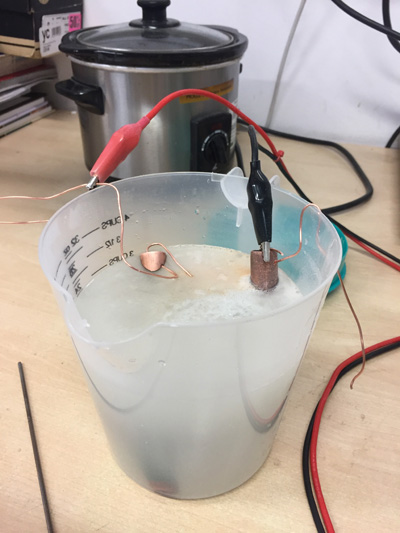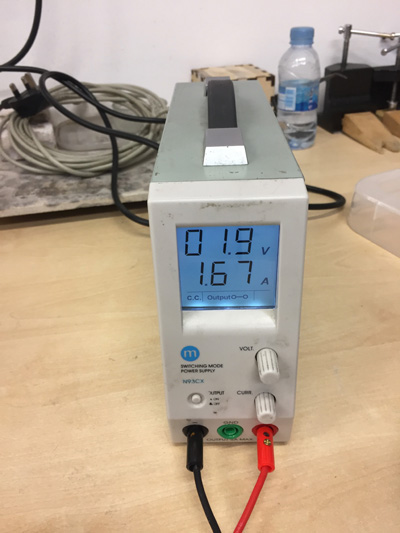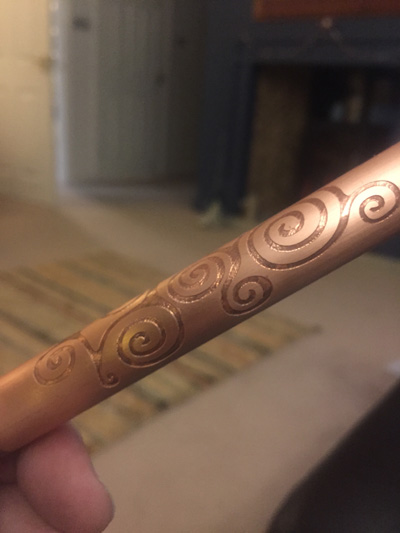Difference between revisions of "Talk:Equipment/Vinyl Cutter"
Joe Design (Talk | contribs) (→*Hi, Just to share a use for the Vinyl cutter in producing accurate and safe etching of copper.) |
Joe Design (Talk | contribs) (→*Hi, Just to share a use for the Vinyl cutter in producing accurate etching of copper.) |
||
| Line 1: | Line 1: | ||
== Vinyl cutter in producing accurate and safe etching of copper == | == Vinyl cutter in producing accurate and safe etching of copper == | ||
| − | ==*'''Hi, Just to share a use for the Vinyl cutter in producing accurate | + | ==*'''Hi, Just to share a use for the Vinyl cutter in producing accurate etching of copper.'''== |
| + | <br /> | ||
| + | '''WARNING: Saltwater etching produces very small trace amounts of non-toxic hydrogen gas (not enough to be of any concern regarding combustibility) and toxic chlorine gas. Do not position your head directly above the container while etching, do not inhale said gas and only perform saltwater etching in well ventilated areas such as outdoors. Please don't let this scare you away from doing any saltwater etching. You won't actually notice the gas via smell or sight as the quantities are very minute. Still, proper precautions should be taken.'''<br /> | ||
| + | |||
Having cut and weeded the vinyl I applied it to cleaned and degreased copper. In this case, a copper plumbing pipe.<br /> | Having cut and weeded the vinyl I applied it to cleaned and degreased copper. In this case, a copper plumbing pipe.<br /> | ||
I applied the vinyl to the copper using the clear low tack tape to align the pattern.<br /> | I applied the vinyl to the copper using the clear low tack tape to align the pattern.<br /> | ||
| − | I then removed the low tack tape and lowered the tube into my salt solution. This solution is made up of sea salt and warm water.'''A Maximum of 100g per L should be fine for no Cl to be produced at the anode'''<br /> | + | I then removed the low tack tape and lowered the tube into my salt solution. This solution is made up of sea salt and warm water.<br /> |
| + | '''A Maximum of 100g per L should be fine for no Cl to be produced at the anode'''<br /> | ||
Then I put another tube of the same size in the solution. '''Make sure these poles do not touch throughout the process'''<br /> | Then I put another tube of the same size in the solution. '''Make sure these poles do not touch throughout the process'''<br /> | ||
The anode from the charge circuit is connected to the piece to be etched. This is where the oxidisation will occur and the metal will give off electrons to the solution.<br /> | The anode from the charge circuit is connected to the piece to be etched. This is where the oxidisation will occur and the metal will give off electrons to the solution.<br /> | ||
Latest revision as of 16:17, 18 December 2017
Vinyl cutter in producing accurate and safe etching of copper
WARNING: Saltwater etching produces very small trace amounts of non-toxic hydrogen gas (not enough to be of any concern regarding combustibility) and toxic chlorine gas. Do not position your head directly above the container while etching, do not inhale said gas and only perform saltwater etching in well ventilated areas such as outdoors. Please don't let this scare you away from doing any saltwater etching. You won't actually notice the gas via smell or sight as the quantities are very minute. Still, proper precautions should be taken.
Having cut and weeded the vinyl I applied it to cleaned and degreased copper. In this case, a copper plumbing pipe.
I applied the vinyl to the copper using the clear low tack tape to align the pattern.
I then removed the low tack tape and lowered the tube into my salt solution. This solution is made up of sea salt and warm water.
A Maximum of 100g per L should be fine for no Cl to be produced at the anode
Then I put another tube of the same size in the solution. Make sure these poles do not touch throughout the process
The anode from the charge circuit is connected to the piece to be etched. This is where the oxidisation will occur and the metal will give off electrons to the solution.
Then I connected the cathode to the other pipe.
A charge was then applied at around 2amps/2V for 20 minutes.
You will see bubbles at the cathode which will be hydrogen from the water and the solution will turn reddish brown.
The salt solution can be used again and again after settling and decanting the copper oxide off.


